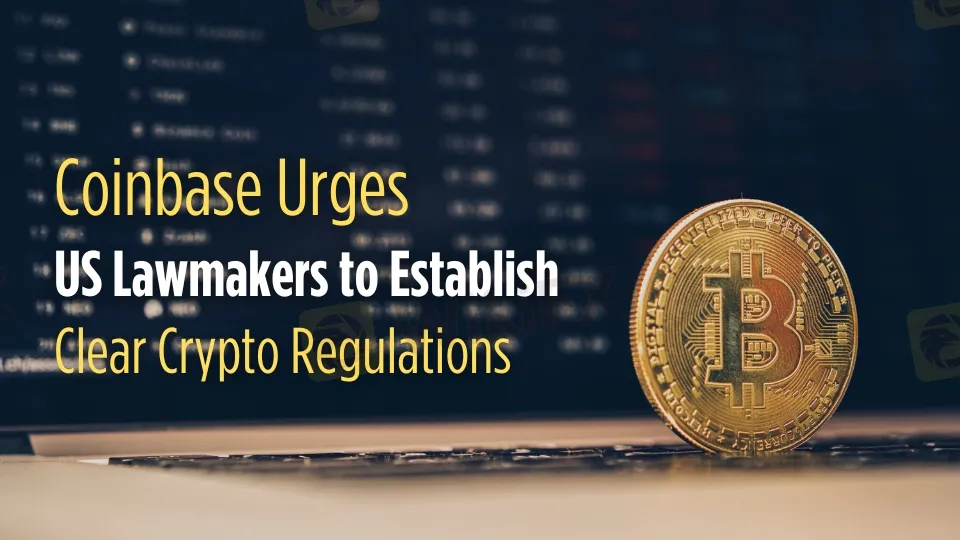简体中文
繁體中文
English
Pусский
日本語
ภาษาไทย
Tiếng Việt
Bahasa Indonesia
Español
हिन्दी
Filippiiniläinen
Français
Deutsch
Português
Türkçe
한국어
العربية
Coinbase Urges US Lawmakers to Establish Clear Crypto Regulations
Abstract:Coinbase calls for clear US crypto regulations to foster innovation, protect consumers, and ensure transparency in the digital asset industry.

Cryptocurrency exchange Coinbase is urging US politicians to provide clear and comprehensive laws for the digital asset market. The company claims that the absence of well-defined legislation not only stifles innovation but also puts consumers in danger and drives crypto-related enterprises to more crypto-friendly governments outside.
In a recent blog post, Coinbase underscored the revolutionary potential of blockchain technology and digital assets, saying, “Blockchain technology and digital assets are reshaping the global economy, bringing opportunities for innovation, financial inclusion, and economic growth.” However, the lack of clear regulation in the United States is strangling this potential, leaving consumers exposed and forcing innovation elsewhere.
One of Coinbase's major concerns is the development of legislation that properly defines digital assets, differentiating between securities, commodities, and other sorts of tokens. This difference is crucial in developing a regulatory framework that promotes growth while protecting investors. Without such clarity, the sector suffers ambiguity, which may discourage both innovators and investors.
Coinbase is also lobbying for the Commodity Futures Trading Commission (CFTC) to have power over the cryptocurrency spot market. The corporation argues that this will increase transparency and safeguard consumers against fraud and manipulation. Additionally, Coinbase is lobbying Congress to encourage the Securities and Exchange Commission (SEC) to adopt laws that allow for ethical funding for blockchain initiatives. The idea is to enable developers to solicit funds without automatically classifying every token as a security, which might restrict innovation.

Stablecoins, which are cryptocurrencies linked to stable assets such as the US dollar, are another area of interest. Coinbase is advocating for a regulatory structure that would ensure stablecoins are “safe, fully backed, and transparent while fostering competition and innovation in the marketplace.” This would restore much-needed stability and confidence in a quickly changing industry.
The need for legislation comes as US politicians are already making moves to confront the expanding stablecoin business. Republican Reps. French Hill (AR) and Bryan Steil (WI) have presented a discussion draft of a measure to provide a framework for issuing and running dollar-denominated payment stablecoins.
“Building on our work on digital assets in the previous Congress, our discussion draft will provide clarity for payment stablecoins and ensure a federal and state path for stablecoin issuers,” said Hill, the House Financial Services Committee chairman.
On the opposite side of the aisle, Rep. Maxine Waters, the committee's leading Democrat, filed legislation last week to provide a comprehensive regulatory framework for payment stablecoins. Her plan imposes stringent rules on stablecoin issuers, including penalties of up to $1 million per infraction and jail for unregistered or unlicensed organizations.
As the discussion over cryptocurrency regulation heats up, Coinbase's appeal for clear standards emphasizes the critical need for a balanced approach. Such an approach would not only encourage innovation but would also safeguard consumers and preserve market integrity. With bipartisan initiatives gaining traction, the United States has the chance to create a regulatory framework that will position it as a worldwide leader in the digital asset business.
The way forward is clear: careful regulation can harness blockchain technology's enormous promise while maintaining a secure and transparent environment for all stakeholders. The issue now is whether politicians can up to the challenge and provide the certainty that the sector so sorely requires.

Disclaimer:
The views in this article only represent the author's personal views, and do not constitute investment advice on this platform. This platform does not guarantee the accuracy, completeness and timeliness of the information in the article, and will not be liable for any loss caused by the use of or reliance on the information in the article.
Read more

How Crypto Trading Transforms FX and CFD Brokerage Industry
Explore how crypto trading reshapes FX and CFD brokerage with innovative products, liquidity solutions, and regulations in 2025.

Why More People Are Trading Online Today?
Discover why online trading is booming with tech, AI, and a push for financial freedom. From stocks to crypto, it’s a thrilling hustle for all.

SEC Ends Crypto.com Probe, No Action Taken by Regulator
The SEC has closed its investigation into Crypto.com with no action taken. Crypto.com celebrates regulatory clarity and renewed momentum for the crypto industry.

Interactive Brokers Expands Crypto Trading with Solana, XRP, Cardano, and Dogecoin
Interactive Brokers adds Solana, XRP, Cardano, and Dogecoin to its platform, enabling U.S. and U.K. clients to trade crypto 24/7 with low fees.
WikiFX Broker
Latest News
Interactive Brokers Expands Crypto Trading with Solana, XRP, Cardano, and Dogecoin
SEC Ends Crypto.com Probe, No Action Taken by Regulator
Why More People Are Trading Online Today?
Fidelity Investments Explores Stablecoin Innovation in Digital Assets Sector
How Crypto Trading Transforms FX and CFD Brokerage Industry
UK would not hesitate to retaliate against US tariffs - No 10 sources
Gold Surges to New Highs – Is It Time to Buy?
Bitpanda Secures Full Broker-Dealer License in Dubai
Lost Money to Scam Recently?! This Article Could Help You!
Navigating the Intersection of Forex Markets, AI Technology, and Fintech
Currency Calculator







